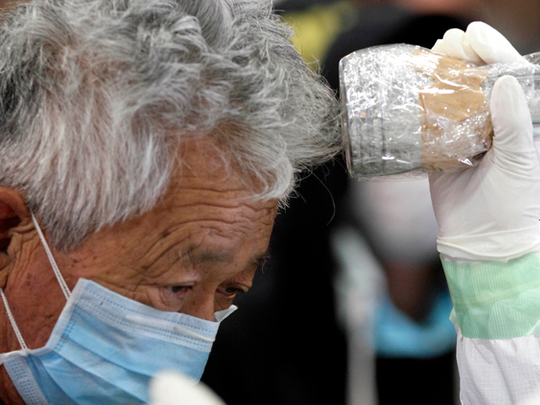
London: A European bone marrow transplant group on Wednesday offered to treat Japanese emergency workers who may be exposed to dangerous radiation from the crippled nuclear reactors.
"Japan is more competent than any European country when it comes to radiation treatment," said Ray Powles, chair of the nuclear accident committee for the European Group for Blood and Marrow Transplantation.
"But they are dealing with an awful lot right now and so we made this offer and are ready to help if they blow the whistle."
Marc Stoll, a spokesman for the International Committee of the Red Cross in Geneva, said Japan's Red Cross has said it so far does not need any help with blood or bone marrow donations.
Doctors say there is a short window of opportunity after people are exposed to radiation when they can assess whether patients will need extensive treatment or a bone marrow transplant.
"After a person has been radiated, you have three to four days before they're on the cusp of severe complications," Powles said. "At that point, they could be put on a flight to Europe if Japanese facilities are overwhelmed."
Powles said 500 bone marrow transplant centres across 27 European countries have been put on alert and could treat 200 to 300 patients if necessary.
He said the group made their offer to Japanese officials and the World Health Organization.
The European group based in Maastricht, the Netherlands, initially drew up its emergency plans to respond to a radiation threat in the aftermath of terrorist attacks and the Chernobyl nuclear disaster.
Radiation typically kills many bone marrow cells, which can lead to a compromised immune system in patients, leaving them vulnerable to infections and other health problems.
Powles said European doctors were not offering to perform bone marrow transplants, but to treat Japanese patients with supportive care like antibiotics until a transplant was possible.
He said it was important to find out how much radiation nuclear plant workers are being exposed to as they attempt to cool reactors.
People exposed to a lethal dose - as was the case with some workers in the aftermath of Chernobyl - will likely die within days. But those who only get a moderate dose could survive much longer even if they ultimately need a bone marrow transplant.
"We do have the luxury of time if workers are not getting increasing doses of radiation as they go into the plants," Powles said.
He said doctors could accurately predict which people would be in trouble 12 to 48 hours after being exposed to radiation and that emergency care could be provided in Europe to keep them alive.
Jim Smith, a physics expert at the University of Portsmouth said the radiation risk to the general public was low, even for people in the immediate vicinity of the problematic nuclear plants.












